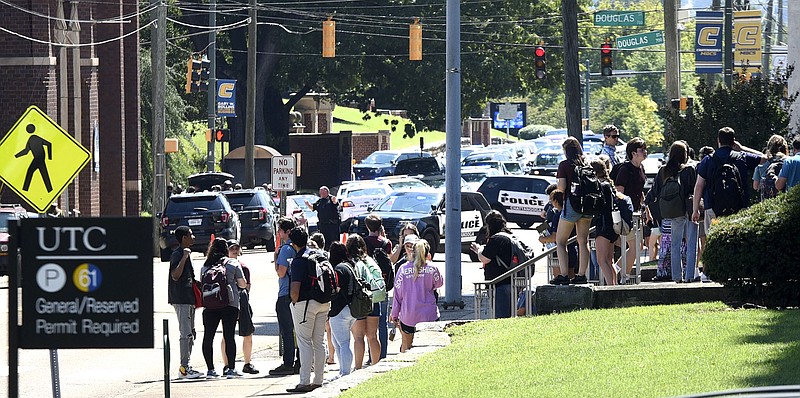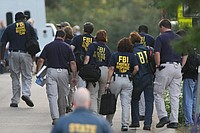A Chattanooga police officer was walking to his house near the UTC campus after his shift Wednesday afternoon, still in full uniform and with his rifle in hand, when a person saw him, wasn't sure if he was an officer, and called 911 to report a suspicious person. That's what sparked an hourslong search for an allegedly armed suspect.
There was a heavy response from Chattanooga and University of Tennessee at Chattanooga police, as well as the Hamilton County Sheriff's Office, with law enforcement officers focusing their search on Fletcher Hall and the Gary W. Rollins College of Business. Roads near that area were shut down, and students were evacuated as police canvassed the building.
Word spread rapidly across social media and by phone calls and text messages, much of which was inaccurate. Police confirmed they'd received unsubstantiated reports of the suspect wearing a ski mask and tactical gear or having been seen in separate locations.
The original 911 caller did not mention a ski mask or tactical gear, police said. In fact, police said he told dispatchers that he thought it could have been a police officer but he couldn't be sure.
The situation at @UTChattanooga seems to be resolved. Very grateful for the rapid response of law enforcement & caution exercised by the decision to remain on campus for the time being. Most importantly, I am thankful that students & faculty are safe. https://t.co/8moueIN1Df
— Chuck Fleischmann (@RepChuck) August 28, 2019
Evacuated students waiting in a parking lot about a block away from Fletcher Hall were heard on the phone sharing information about a suspect having been caught and that the building had been cleared. The building had not been cleared at the time, and no armed suspect was ever found. Police approached one of the students who had been sharing the erroneous information in an attempt to clarify.
After locating the person who made the original 911 call and confirming more firsthand information, Chattanooga police determined it was one of their own officers who was carrying his rifle from his vehicle to his house after his shift. He was in full uniform and was going home to sleep, Roddy said.
But in a twist, that same officer responded to the very SWAT call he sparked and was helping in the search. Police didn't say how he reacted when he learned he'd been searching for himself.
In a news conference Wednesday afternoon, Chattanooga police Chief David Roddy said the heavy response was out of "an abundance of caution."
He said the concern was understandable, because "of where we are just in society now, of threats and fear for our safety, especially when you're talking about incidents of mass violence."
But Roddy cautioned people to be more cautious in what they consider reliable information.
"Pause for a moment and consider where their information is coming from ... before [you] pass that along," he said. "Because it does create real fear."
"We do not in any way critique anyone for calling in something that they directly see that concerns them," he said. "The part that I think we should pay better attention to is what do we do with the information that we heard from someone else. If that is so far removed from the actual incident itself, there's a pretty good chance it's not going to reflect what law enforcement and first responders are being asked to respond to, and it changes the entire mechanism and dynamic of how we respond."
While Roddy said he didn't think people reported what they heard out of malice, he said misinformation does cause distractions and makes law enforcement less effective.
"You had hundreds of law enforcement officers here today, getting pulled out of calls for services. You had ... could not imagine the number of loved ones, parents spread around, not only the city, the state and the country, having children attending UTC that were also put into a stressful, tense, anxious situation because of those 'well, I heards,'" he said.
Roddy urged people to go to trustworthy sources for their news.
"Go to the police department where you live or where your children are at. Get on their Twitter feeds. Go to our local media outlets and trust what we're getting to them as quickly as we can to help streamline and vocalize what we're doing with that information, as opposed to getting it off your friend's feed."
UTC alert system
UTC students who would like to receive campus alerts can sign up here.
The scare promoted three local schools - Chattanooga Schools for the Arts and Sciences, Brown Academy and Battle Academy - to go into lockout status, meaning students were moving freely within their buildings and classes were normal, but no one was allowed to leave the buildings.
Hamilton County Schools spokesman Tim Hensley said parents of students at those schools had been alerted to the situation through the district's alert system.
But as far as UTC itself, the campus did not go into lockdown, and classes - even those held in Fletcher Hall - were not canceled.
Instead, once campus was given the all clear from law enforcement, professors were asked to use their discretion on whether to hold classes, according to UTC officials. Students were not required to attend classes for the rest of the day.
UTC spokesman Shawn Ryan said there was no indication of an armed man ever being on campus, though a campus alert sent to students said, "Police are searching for a white man w/ blonde hair carrying a rifle walking on E 8th St toward UTC."
Ryan did say there were reports of a suspicious person inside Fletcher Hall, and that's why the campus was not put on lockdown, according to a tweet from UTC. A campus alert was sent with that information, as well.
While some students said they thought the situation was handled well, given the information officials had, others weren't so sure.
Samantha Zimmerman, a senior at UTC, was on campus in Frist Hall - located next to Fletcher Hall - when she received an email from one of her professors telling students that classes were canceled.
"It was scary for sure," Zimmerman wrote in an email. " ... Since the school never went on lock down, it was just really hard because we didn't really know if we were safe to leave or not. I understand how hard it can be to communicate with situations like these. But a couple students and I just remained in Frist; unsure of what to do, up until all things were clear."
Another student, Sam Jankiewicz, received a message from a professor at 12:47 p.m. telling students to assume classes would be held unless they heard otherwise.
Jankiewicz said he instead chose to leave campus because he felt his safety was threatened.
"Class was at 2pm and no update that deemed everyone's safety was released until 1:45pm or later," he said in an email. "I believe putting the campus on lock down and cancelling classes would have given students much more peace of mind."
Jankiewicz and Zimmerman both said they thought university officials should have taken more precautions.
We understand the distress a situation like today’s—even when it turns out to be a false alarm—can cause for students, parents, faculty and the community. We appreciate the feedback & will continue to evaluate our procedures to best provide for the safety of the campus community.
— UTChattanooga (@UTChattanooga) August 28, 2019
"Whether or not the reports of a suspicious/ armed person near/ on campus were valid or not, informing that to students and then failing to take necessary precautionary steps to ensure safety, seems quite negligent," he said. "Telling students to just stay alert and continue to go to class without giving adequate information only caused more panic on campus."
But other students and professors were more understanding.
"I feel like the university should potentially have gone on lock down if it was seen more of a threat, but I understand it's easier to keep people more calm if they do not make a huge deal if it's not a big deal," McKenzie Gregg said.
Gregg had friends who were in Fletcher Hall at the time of the evacuation, but "since it was handled so quickly and they had an evacuation plan, they were pretty calm," she said.
Two college of business professors, who did not want to be identified, said they had about a dozen emails from students who didn't want to attend class. Other students didn't seem as concerned but had been asking if classes would be held at all.
The professors did cancel their classes, but stopped short of making a judgment on whether the university handled the situation well.
"I do find that, generally, administration is very responsible, in my experience, and cautious about safety for students," one professor said. "I'm going to suppose they had more information than I did."
Under Tennessee law, students are never allowed to carry guns on university or college campuses, however, full-time faculty, staff and other employees who have handgun carry permits can, but they must notify the local law enforcement agency that provides campus security. The law went into effect in 2016 under then-Gov. Bill Haslam.
Staff writer Meghan Mangrum contributed to this story.
Contact Rosana Hughes at rhughes@timesfreepress.com or 423-757-6327 with tips or story ideas. Follow her on Twitter @HughesRosana.

